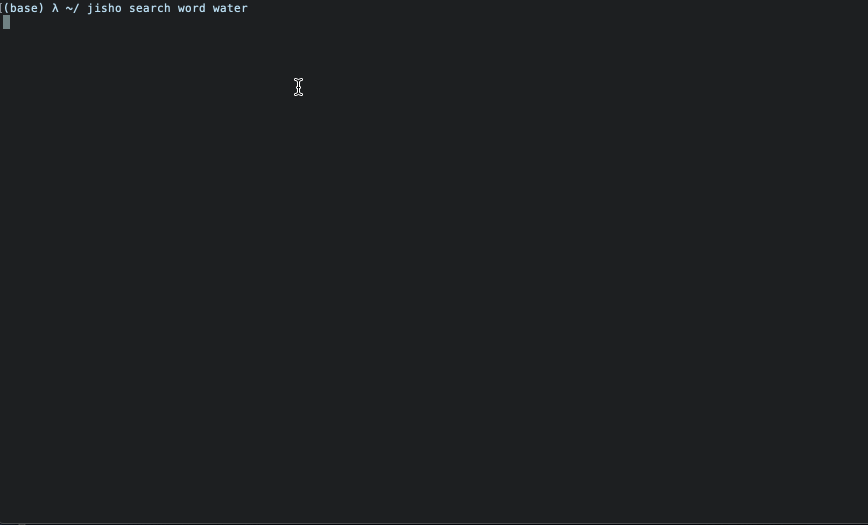jisho-api
A Python API built around scraping jisho.org, an online Japanese dictionary.
pip install jisho_apiRequests
You can request three types of information:
- Words
- Kanji
- Sentences
- Tokenize sentences
The search terms are directly injected into jisho's search engine, which means all of
the filters used to curate a search should work as well. For instance, "水" would look
precisely for a word with just that character.
Check https://jisho.org/docs on how to use the search filters.
jisho search word water
jisho search word 水
jisho search word "#jlpt-n4"The request replies are Pydantic objects.
You can check the structure of a word request in jisho/word/cfg.py, and likewise for both kanji and sentences.
You could also do so programatically, by doing:
from jisho_api.word import Word
r = Word.request('water')
from jisho_api.kanji import Kanji
r = Kanji.request('水')
from jisho_api.sentence import Sentence
r = Sentence.request('水')
from jisho_api.tokenize import Tokens
r = Tokens.request('昨日すき焼きを食べました')Note: Almost everything that is available in a page is being scraped. Note: Kanji requests can come with incomplete information, because it is not available in the page.
Scrapers
You can scrape the website for a list of given search terms.
Supply them with a .txt file with the words separated by newlines.
jisho scrape word words.txt
jisho scrape kanji kanji.txt
jisho scrape sentence search_words.txt
jisho scrape tokens sentences.txtAll of the resulting searches will be stored in ~/.jisho/data.
In case you want to scrape programatically you can:
from jisho_api import scrape
from jisho_api.word import Word
word_requests = scrape(Word, ['water', 'fire'], 'to/path/')This will return a dictionary, which key values are the search term and request result. Failing requests are not included.
Cache and config
If you want cache enabled just run
jisho configThis will create a ~/.jisho/ folder with a config.json with your settings.
All your searches will be cached, and accessed if you search for the exact same term again.
Notes and considerations
According to this thread, there is no official API, although there is a kind of API request made by jisho.org, which is used to scrape words. This does not work for Kanji tho, because it would search the Kanji as a word, and not have any relevant metadata for the character itself.
Permissions to scrape also granted in the aforementioned thread.
As stated in their about page as well, jisho.org uses a collection of well-known electronic dictionaries:
This site uses the JMdict, Kanjidic2, JMnedict and Radkfile dictionary files. -jisho.org
Credits and Acknowledgements for data
All credit is given where it's due, and the several extracted resources is given at jisho.org's about page.

